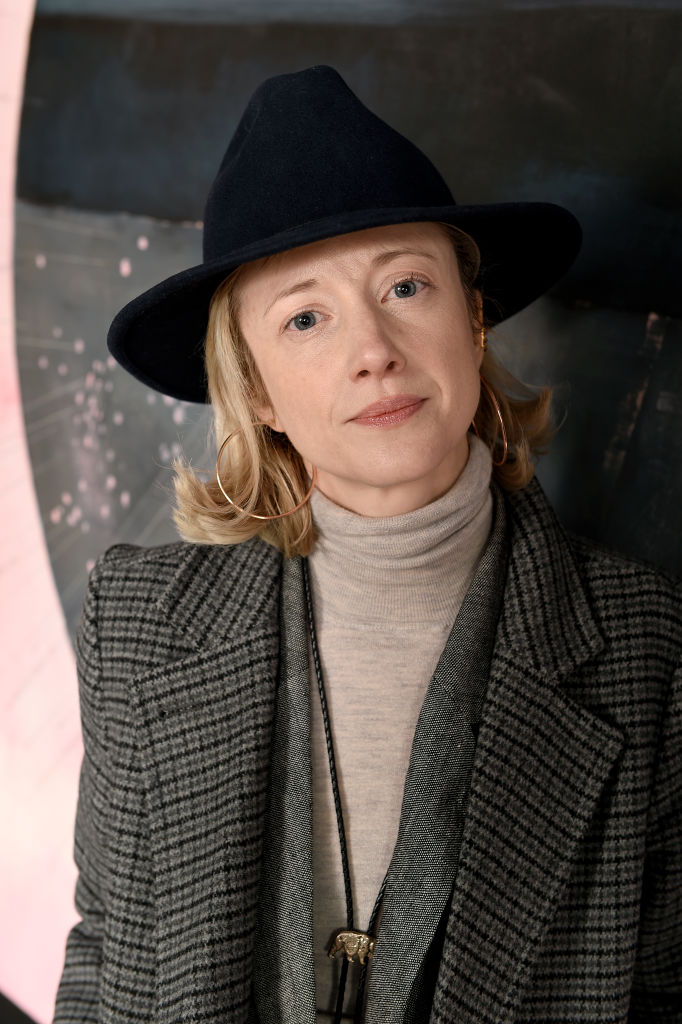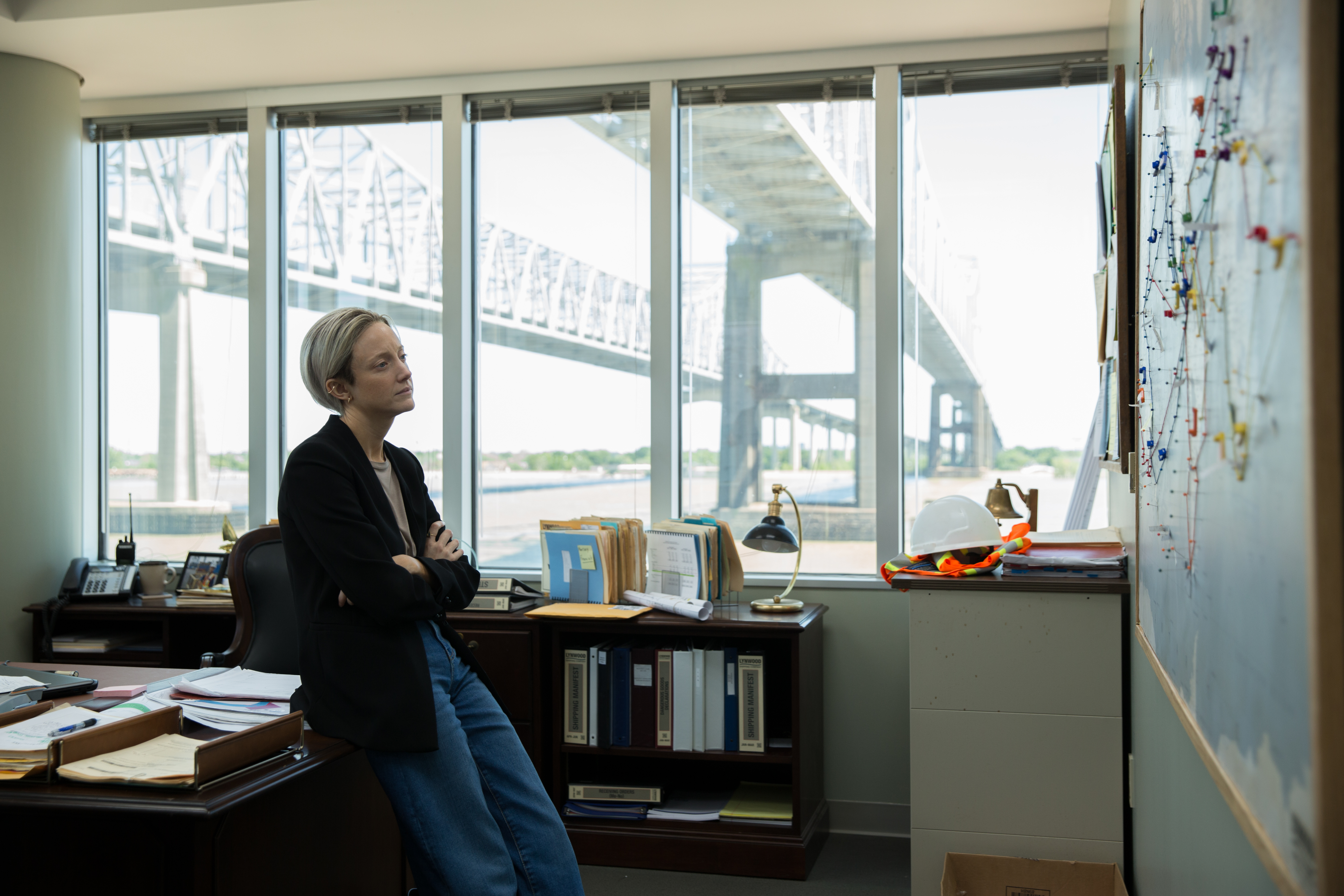
- Interviews
Andrea Riseborough: “Playing Emma was liberating”
Based on Italian writer Roberto Saviano’s brutally candid novel ZeroZeroZero, the eponymous streaming series explores the inner workings of the cocaine trade and distribution worldwide. In a multilayered story that touches several continents, Andrea Riseborough plays the daughter of a New Orleans shipping mogul, who is involved in the dangerous world of drug trading – a rough and emotionally distant character directly opposite to her recent role as the kind and compassionate Alice in The Kindness of Strangers.
In ZeroZeroZero, you play Emma Lynwood, who is part of a shipping family in New Orleans involved in drug trafficking. What was your initial attraction to the very rough and dark world depicted in the show?
It was mainly Roberto Saviano, who is such an incredible journalistic novelist. He is such an unusual writer. He is clearly incredibly brave and sacrificed his own personal safety to uncover as much truth as he can on whichever subject he is writing on, which was also the case with the book ZeroZeroZero. And I loved Gomorrah.
What made you want to be part of the series that is based on the book published in 2013?
I really connected to the creator Stefano Sollima. He has inexhaustible amounts of energy and I liked it when he spoke about the depth of the relationship between my character and Dane Dehaan’s character, Emma’s brother Chris. We really built the character from scratch. It is strange when you commit to something that is episodic, which I don’t have as much experience with as I do with film. Essentially you don’t know the trajectory of the character and you don’t know what the whole landscape is going to look like. You have no idea where it is going to end, so in some way, you jump blindly into it.
Emma Lynwood is not using her sexual currency to get ahead. She is a rather tough businesswoman.
Gina Gardini, the incredible producer and mastermind, and Stefano and I talked about the fact that Emma is a very almost asexual being. It was very liberating to play that character. It was wonderful to walk into a room and not give a shit about everybody thought of me. Women are encouraged to be so emotionally intelligent but reading my piece in this whole puzzle as a character was to be the person who really could not afford to have any feelings about what was going on because the weight of the family business stands on her shoulders. Her father has become detached from the reality of what that looks like and her brother has occupied this state in his mind that he is unable to step up because if his illness. She very much wants to not shoulder this business alone but ultimately the more that she shoulders the weight, the more she gets addicted to it and the more tantalizing it is and the more power-hungry she becomes.
That is one of the things that I really liked about this piece. There is a woman at the center of this and for better or worse, judging her or not she is commanding most of the power dynamics. The reality as a human being and somebody who has an all-female film company and all of my personal stuff, I had to think of the reality of potentially being in the very masculine environment for one and a half year and with press two years. It was something that I certainly had to spend a long time thinking about (it) and ultimately what came out of the thoughts about that was that it felt important to play a woman in control in this environment. She is not a character that young women aspire to be – clearly not in terms of career choices, but we see a male anti-hero so often in an episodic series and it just felt so important and interesting and innovative that at the center of this series was an unapologetic anti-hero presented with all of her flaws. I think that is the most exciting thing about most characters – it is when we get to see their flaws and what I consider to be their humanity.

Andrea Riseborough as Emma Lynwood in ZeroZeroZero.
patti perret/amazon studios
Everything! It was such an education. Just to get to step into a world like this and glean any inside knowledge about a world like this, we could not have been in better hands than with Roberto Saviano because he has immersed himself into this world. In the beginning of the book ZeroZeroZero, there is a manifesto of honor. It is like an expression of how above all else, power and honor are most important. It is above money, above sex, above anything else. The honor relationship is the most important. That was really the base of where we took the Lyndwood family. It was also interesting to play an American character, who is born and raised in New Orleans with a family history of a shipping company. It could originally have been just a shipping company but there is probably also dark history in that. It is interesting and terrifying to think of what that family might have shipped in and out of that port in New Orleans hundred years ago. She has these incredible links to an Italian family and this affects their ideology. She is a very international figure.
You are born and raised in the UK. How did that affect your performance?
I felt almost fortunate to be British playing that character because it gave me enough remove from both American and Italian culture and when you stepped into the other parts of the world that we stepped into which was just life-changing – working in Senegal, Morocco, Calabria, New Orleans, and Mexico City – in and around Mexico – was really life-changing. To see how someone who has so much power in this industry actually has so little knowledge of the lives that it touches and the lives that their product touches. It was kind of mind-blowing. Some maybe have a glamorized idea of what the cocaine world looks like – it is often portrayed in film as mildly titillating and maybe something you would want to be part of. But when you read Roberto’s book and watch the series, it becomes very clear that it is not portraying it in this vein. It is something that you absolutely would not want to be part of and it is life-threatening – and the people who are the worst affected are those at the bottom end of each community. We see that especially in Mexico, Mali and Senegal, which we shot in Morocco.
In The Kindness of Strangers, your character, who is a nurse, is all about being kind and compassionate – the opposite of your character in ZeroZeroZero. A lot of actors say it is much harder playing a good person than a bad person. Is this the case? Was this a hard role for you?
I don’t know but I should probably say to you that this is probably the closest character I have played to myself (laughs). Playing Alice in The Kindness of Strangers was such a joy because she is one of those selfless pillars of the community. One of those that we are actually relying on right now during this pandemic, who put themselves very far down the chain of how important they are and they sacrifice their own well-being and safety to take care of other people. She really does it for very little compensation. I think Alice loves to be a part of a community but she is such a lonely and solitary figure and she is actually the exact opposite of Emma because she is absolutely part of the community to the point where she is running the community. Yet, she is emotionally detached from them but Alice is so engaged with every little human exchange in life and every little moment that she values. It was absolutely wonderful to play that character. But it also felt wonderful to play Emma and to not be confined by any of the social trappings that we are often confined by as females, so it was incredibly liberating to be emotionally detached and to not be expected to be emotionally engaged. I actually played Alice in the middle of playing Emma. We shot a month and a half on ZeroZeroZero and then I had three weeks break while we relocated to Mexico on Zero Zero Zero and then I flew to Canada because I really wanted to work with Lone Scherfig and with the dream cast Zoe Kazan, Caleb Landry Jones, Jay Baruchel, and Bill Nighy. Then I flew back to Mexico.
Speaking about Lone Scherfig, you have created your own production company, Mothersucker, in order to tell female stories. You produced Nancy as your first project. Are female writers and directors different?
It is really important that we get as many diverse voices in entertainment, art, and literature as possible. For too long we have had a lot of different nuances of the same perspective and it is wonderful to be able to help in any way the young writers who identify as female get their perspective out to the world. It is often on a shoestring. It is difficult to rally a lot of money for a project like Nancy, which is about a woman who is living alone with a cat. It is very difficult to draw interest because the strings are still held by the very same people who held them eighty years ago. That is a transition that we are all going through and there are so many inspiring women in that realm – incredible heroes, who are championing more new diverse work. It is what I am the most proud of that I have done in my life other than maybe my relationship. We could not believe that the writer and director Christina Choe won the Waldo Salt Screenwriting Award at Sundance. So in so many ways, it was such a win and the women who were involved in making that film have all gone on to have a lot of work and more work and more lucrative work and a lot more exposure. It has been really rewarding.
And what was it like working with Lone Scherfig?
I would work with Lone Scherfig every day of my life if I could. She is one of the most glorious and beautiful, intellectual and delicious people I have ever spent time with. I felt a real kinship with her and it was a very natural, easy, fun and fulfilling relationship. I think our mission statement with that film in many ways was this radical act of kindness in a world that so needs that. She wanted to recognize the unsung heroes and I admired that. I admire all of her work and I think she is a really brilliant director.

